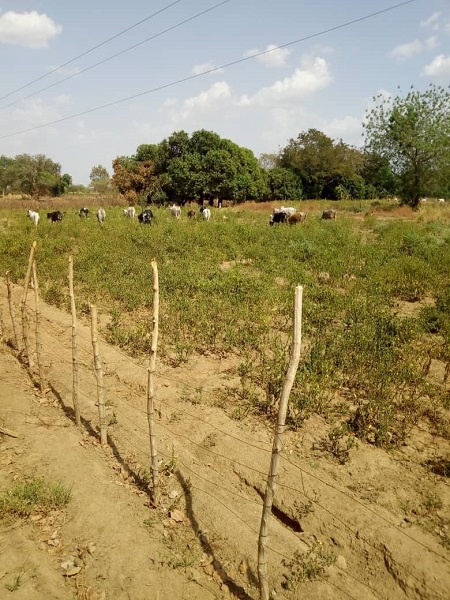The non-enforcement of by-laws on stray animals in the Kassena-Nankana West District of the Upper East Region has been identified as one of the major threats to vegetable production in the area.
Majority of the indigenes in the area particularly the youth and women depend on the production of agricultural vegetables as their primary source of livelihood. For instance 75% of the population in the Anaanore community, which is one of the communities in the District, depends on the production of agricultural vegetables such as tomato, pepper, onions among others for their livelihoods.
The research conducted by Anaanore Dry Season Farmers Association and sponsored by the Business Sector Advocacy Challenge (BUSAC) Fund and its development partners DANIDA, European Union and USAID was made known during a dissemination forum held in the conference hall of the CEDEC Guest House at Navrongo in the Kassena-Nankana Municipality on Tuesday.
The research also revealed that the situation was forcing a lot of the vegetable farmers who are youth and the active working populations to abandon their farms and to migrate from the area to the southern part of the country to seek for greener pastures.
‘’ This continues to dwindle and sink the interest of most especially the youth in the area; leading to their migration to the bigger towns in search for non-existing jobs’’, one female respondents lamented her ordeal:
The research stressed that the vegetable farmers are deeply worried because stray animals continue to destroy their vegetable farms on daily basis, making their investments go waste, and putting the survival of farming families at risk.
“It is worrying seeing myself engaged in vegetable farming in this part of the world, where unfavourable weather condition and lack of assistance from government or Non-Governmental Organization, have been the order of the day. I struggle day and night to water my small vegetable farm to take care of my children, but as it stands now, am afraid and worried about what to do, as the business becomes too challenging. But the most painful aspect is that, after going through all these tough times and challenges, people will leave their animals to come and feed on my crops, leaving me and my children stranded”.
The research also indicated that the situation has led to intense manifestation of hostilities and social frictions among crops and animal farmers in Anaanore community and asserted that they could have made higher profits if the stray animals did not destroy their crops.

It was also discovered through the research that although the Assembly had enacted by law on stray animals on only raining seasons and enjoins a maximum amount of twenty-five Ghana Cedis (GHc 25.00) as penalty for breaking the bye-law, it felt that the amount was far below the cost of transporting the animal to the district capital which is about 75km away from Ananoore for the officials at the district assembly to determine the necessary resolution and adjudication.
The Secretary to association Mr. Maxwell Akunyire, explained that the research dubbed” Advocacy for the Enactment of Stray Animal Bye-Laws and its Implementation” which was conducted in December, 2017 with support from BUSAC Fund was structured to identify areas of advocacy, for the enactment and enforcement of bye-laws on stray animals in the Anaanore community of the Kasena Nankana West district
He stressed that it was very expedient on the part of duty bearers to have an immense knowledge about the plight of vegetable farmers and indicated that the study would be used as a report to represent the voices of the vegetable farmers and to advocate for the constitution of a committee of experts who would study the content of the report and review or modify the existing bye-laws on stray animals.
“When this is done, it will resolve the sinking and dwindling vegetable farmer interest in vegetable production and further reduce the migration of the active working populations from the Anaanore community to the southern part of the country to seek greener pastures’
The Monitor of the BUSAC Fund, Mr Vincent Subbey, who commended the group for their advocacy strategies, pointed out that the phenomenon of stray animals causing destruction of farmlands was not only limited to the Kassena-Nankana West, but the entire regions of Northern Ghana.
General News of Wednesday, 5 December 2018
Source: Samuel Akapule, Navrongo













